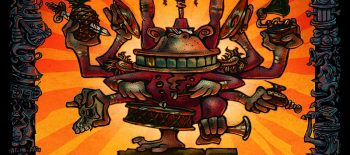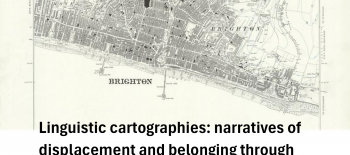Celebrating the 101st anniversary of the opening of the Under the Picador café
When Poland regained its independence in November 1918, the metropolitan character of Warsaw ran free. It was now a city where cafes and bars became spaces and meeting places for the intelligentsia and artistic bohemia and where young poets and artists took on performative roles; roles that mirrored a vibrant cabaret scene which had captured the celebratory élan of the times. The possibilities of these reconstituted venues presented burgeoning poets in particular, eager to make their mark, with the possibility of connecting with new audiences and readerships. To the fore in this regard were the Picador poets, whose short-lived cafe enterprise Under the Picador would launch the stellar literary careers of Julian Tuwim, Jan Lechoń, Antoni Słonimski, Jarosław Iwaszkiewicz, and Kazimierz Wierzyński, all of whom would forge lasting literary legacies.
Initially the combined activities of Tuwim, Lechoń and Słonimski revolved around their involvement with the satirical revue Sowizdrzał (The Scamp), whereas Lechoń and Tuwim solidified their positions as leading poets of the new era with the publication of their poems and pronouncements in the Warsaw University student literary journal Pro Arte et Studio, which gained national notoriety when Tuwim, on the verge of abandoning his Law studies, published a scandalous dithyrambic cityscape poem entitled ‘Wiosna’ [‘Spring’], which featured disease-carrying prostitutes and slothful male protagonists. If Tuwim had been looking to announce his arrival as a poetic enfant terrible, he couldn’t have found a more disreputable way of doing so. Detractors were appalled by what they regarded as the poem’s attack on beauty per se and its seeming dehumanisation of their fellow man. This debate went beyond the realm of committee room and most of Warsaw’s newspapers and literary journals jumped aboard the bandwagon of condemnation.
Słonimski wrote that he couldn’t actually remember the day or the month when he first thought of a poets’ café in Warsaw but seemed to remember first discussing the idea on a Warsaw tram. He and his friend, Tadeusz Raabe, who had just returned from Russia having spent four years in a POW camp, were pondering the success of poets’ cafés in Moscow and Petersburg when the idea occurred to them to try their hand at a similar venture in Warsaw. Failing to find institutional support for his idea, Słonimski went to Tuwim and Lechoń, who were also seeking outlets for their work
Their petition was made to the censorship board, which at the time was pursuing a strict policy of confiscating subversive material. In their application they stated that their new café with its name Under the Picador would not be a centre for political activity but that its only function would be to ‘defend the young artists of Warsaw.’
A location was found in a small locale on Warsaw’s most fashionable street, Nowy Świat, and an agreement was made with its owner Kazimierz Życki that the poets would receive the takings at the door, whilst Życki would keep all the proceeds from all food and beverages sold. The advertising campaign prior to the opening was extensive, with leaflets and posters containing mock-revolutionary tones calling upon the people of Warsaw and their fellow countrymen to attend: ‘Countrymen! Workers, soldiers, children, the elderly, people, women, intellectuals and playwrights.’ Also in the same flyer, they exhorted the young artists of Warsaw ‘to unite’.
The day before the opening of the café, Tuwim and Słonimski despatched their ad-hoc manager-cum-editor Mieczysław Grydzewski on an errand to invite fellow budding poet Jarosław Iwaszkiewicz, newly arrived to the city from the outlies of Kiev, to perform alongside them on the opening night. When Iwaszkiewicz arrived in the small premises under preparation, he saw painters Kamil Witkowski and Aleksander Świdwiński in the process of producing life-sized murals, later described by Tuwim as ‘fragments of reality’. In due course, Tuwim and Słonimski informed Iwaszkiewicz about their plans:
Starting the next day, we were to read poetry, give talks, provoke discussion between poets and the public. We were to receive for this a fair share of the takings.
Earlier that month Marshall Józef Piłsudki had entered the city, having been released from his imprisonment in Magdeburg. In the weeks that followed, Warsaw’s streets were teeming with expectation and prone to outbreaks of violence. Such a climate determined the ambience of the café, which, according to Słonimski, was a model of sobriety and decorum amidst the surrounding chaos:
And so Picador had the character of a street theatre. There was no intimacy to be found, no distancing oneself from the masses of Philistines. […] Anyone could enter Picador from the street for the modest sum of five marks. Vodka and meat were not sold; it was but a small cake shop where trembling poets read their poetry in front of an arbitrary public.
The Picador café’s inaugural evening took place on 29 November 1918. The carte de nuit was a modest affair, offering coffee, tea and cake. In addition to the menu, patrons could peruse a comic literary price list that included the prices of poems with dedications; and even marriage proposals were entertained. For the first half of the programme, each poet took turns to recite their poetry. The second half of the programme began with a comical discourse on art and its current forms which involved questions from the audience. This was followed by a speech entitled ‘Invective’, made by Tuwim, where he hailed the ‘triumphant tomorrow’ and attacked a list of stereotypical societal figures whom he considered would make little or no contribution to the rebuilding of the nation. This task he relayed to the workers of Poland and consequently awarded them with ownership of the future:
With laughter and disdain the future smacks your face, you sick weeds of the Great War, big city licks, blasé dissemblers, […] lazy servants of fashion and luxury, bloodless and mediocre dandies of an old Europe. You must bleed and die in a great pool of blood!!! The Time of the Workers is at hand.
Tuwim’s speech typified the Picadors’ literary and political verbal attacks on current stereotypes and real people. Parodies performed by Słonimski, Lechoń and Tuwim, closed the evening’s entertainment, which also showed their ability to laugh at themselves: ‘Lechoń parodied dramatists, I – lyricists, and Słonimski – me … and then it was all over.’ Various parodies and satirical sketches were performed over the following months. Under the Picador would open every weekday night at 9.00 pm, and its programme lasted for two hours, following which, the hungry and thirsty performers would ritually make their way across the road to The Turk restaurant for, as Iwaszkiewicz remembered with relish, ‘veal cutlet with egg, apple pie and excellent Turkish coffee, thick as porridge and sweet as honey’.
Over the following months, other debutante poets recited their poetry in the Picador café. However, it was the debut of Kazimierz Wierzyński that would make the greatest impact. Wierzyński had earlier attended, along with his childhood friend, Wiliam Horzyca, a number of evenings in the Picador café. Therefore, having been intimate with the Picadors’ program, it is probable that Wierzyński both adapted his poetry to suit the climate of the café, and redirected its address in terms of its poetic appeal to the masses. Encouraged by Young Poland poet Leopold Staff, Wierzyński arranged to visit Tuwim in his apartment on Królewska Street on the evening of 23 January 1919. Of their first meeting Tuwim wrote the following in a letter to his fiancée Stefania, dated two days later:
Leopold Staff is paying me a visit tomorrow, Karski, Przysiecki and Wierzyński are also coming along. That last chap is wonderful. In fact, he came to see me the evening before last, introduced himself and proceeded to tell me how great an impression my book had made upon him […] He’s a delightful chap and writes incredibly joyful things! A merry fellow, a Whitmanist, healthy, young, ‘with a gravitation towards alcohol’, as they say.
Later that evening, Tuwim, reciting Wierzyński’s poem ‘A Buzzing In My Ears’ [‘Szumi w mej głowie’] introduced Wierzyński to the audience of Under the Picador for the first time. Wierzyński’s predilection towards alcohol and his sociable nature enabled him to quickly settle into the group’s idiosyncratic lifestyle. He warmed in particular to the late nocturnal conversations in The Turk, which continued to be an important ritual. Some time after this, the Picadors accepted a proposal from the Futurist poets, Anatol Stern and Aleksander Wat, to join them at their premises in the basement of the Hotel Europejski. Despite hopes of even greater successes, the move to the upmarket hotel belied the notion of poetry on the street; and with the general public little able to afford such a setting, attendances fell dramatically. In addition, the repertoire was less rigid than the old Picador café performances; and often, uninvited guests would provide spontaneous recitals. Relations soon soured. Poetic evenings took place on a less regular basis, and by the end of February 1919 the entire enterprise had been brought to a close.
From its inception, Under the Picador both symbolised and exemplified the many emotions that accompanied Poland’s first months of independence. The Picadors crystallised a societal transformation occurring within the country by altering, albeit temporarily, the relationship between the public and the poet. What was most important, however, was the fact that the café itself did not pose any barriers to the wider public other than the low cost of the entrance fee. The success of the café had an immediate beneficial effect in that the poets were able to organise the publication of their collections, and in conjunction with the café’s success, the Picadors also had the opportunity to sell their books on the premises. These books sold in their thousands. Stemming from the time of Under the Picador, the Picadors (who would rebrand themselves at the end of 1919 as the Scamanders prior to the launch of their poetry journal Skamander), harnessed a principle of artistic difference whilst cultivating a common identity in both the eyes of the public and Warsaw’s literary agora. Wierzyński described in later years the Picadors’ programme as having been a combination of the everyday and the universal. This was no vague reminiscence but rather an insightful summation of both the topographical nature of a group performing in the bohemian beating heart of the city and the performative nature of their poetry, which in many respects collectively encapsulated the vision of a nation that had one foot in the past, the other firmly in the present, and with an eye on taking the next stride forwards towards the future.
*
Today the story of the Picador café has all but faded from popular memory but its location is marked by a memorial tablet that’s an immovable fixture on the itineraries of Warsaw’s increasingly popular literary tours. Imagination can also make up the shortfall; and with a great deal of artistic licence the poem I have penned, and which is featured below, has attempted to reinvigorate memory, capture the climate of the café, and convey in part the Picadors’ performative brilliance.
Picador
On 29 November 1918, Poland’s independence was celebrated by the inauguration of a poets’ café newly opened on Nowy Świat, Warsaw’s most fashionable street. The poets themselves were five and they would later call themselves the Scamander poets. But on this night, they were the Picador poets, and what follows is an imagined account of their first evening’s performance.
Artists Unite. Poetry For The Street, and the declaration:
Long live us all. People of Warsaw, the learned, the stupid,
The young and the old, most women and the rest of them,
The rich, the poor, the titled, the homeless, actors – good and bad –
Bad poets, good listeners, wielders of scissors, shovel or sword,
Maidens with money, wealthy wives with death-bed husbands:
All here eating cake… sipping tea.
Antoni Słonimski rose to address those sitting before him:
‘Ladies and Gentlemen, and the Rest who have come,
You’re here for something different, some call it fun.
But be warned, take care, for it’s bruised you’ll leave,
You’ll be stripped of what you know by our songs,
By this new voice of youth which tramples the street,
Shaking hands with the many or as many we meet.
You are our subject, so the choice is plain:
Raise your heads sky-high or hang them in shame.
It’s a damaged lot I see before me tonight,
Whose parent and grandparent and great-grandparent
Spent long years bewailing our country’s long night,
And spoke of the need to fight and draw blood.
Death is glory, they cried, as they faced what they faced –
Spring was mystically black and summer puzzlingly cold.
Tonight we see the world through different eyes.
We breathe the bracing air of our first free spring.
Though perhaps not in here!
Sit closer to the door, you two!
Your pungent smell will certainly upset
My friend, shaking behind me here,
Set to set the record straight.
Jan Lechoń, our youngest poet.’
And he who was youngest took his place on the podium
To the sound of polite applause. And pale was he:
‘Our Polish heroes are dead. What would they say now?
Fight on! Find foe and cannon! Take them on! Run them through!
There is no nation without blood spilt! Attack!
There is no art but that which makes you bite your lip
And swear death on the foreigner swaggering in front of you!
The present moment flies in the face of this call,
And our motherland has no foe but her own leery brood.
We are the enemy within these walls, slashing
Wrists with heirloom-gilded table knives.
Look at the devils in our midst – our holy rites.
Look at the shackles on our feet – our sacred myths.
Murder is abroad on the night, o Citizens,
And our luckless past and glorious future are locked
Together in a struggle. Our sacred memory and texts
Will not inspire a nation of nation-builders. Look out the window.
What do you see but a lost and leaderless lot. Yet the great streets
Are rising. The scream of the thronging crowd will be whispers.
The stars will reverberate from their echoing.
Mothers will shed soft and silent tears, and trumpeters
Will play their part in the day, playing notes that choke
With affection. And horses will tramp loud upon the ground,
And the cavalry will laugh gallant, and we’ll ring the bells
With all our strength. The priest, in red and gold,
Will raise the host twice, and the people will bow their heads…
And be satisfied. Banners! Banners! And he whom we love,
Dressed in grey… will sit silently upon his horse.’
The poem complete, he who was young turned his back
On the crowd and returned to his companions.
And a man from the audience stood up and voiced his judgement:
‘I understood not one word. But what a poet! Who’s next?’
And Antoni Słonimski was most impressed:
‘Your taste is a credit to you, Sir. It is beautiful, is it not,
To not understand and still know what a man means?
The next poet is a devilish sort with a twinkle in his eye.
Ladies and Gentleman, and the Rest of you,
I give you that stirrer of controversy, Julian Tuwim.’
And Julian Tuwim, the stirrer of controversy,
Stood up and launched into this combustible tirade:
‘I see the world with my million eyes,
and each absorbs the world.
The world is in me and I in it.
It is all ‘I’ and what I see.
And what I see makes me bigger,
And makes what I say more important.
So hear what I see,
And let’s see what you think,
And then we’ll see what next to do.
Listen now to the drunkard’s song out in the street,
And he sloshed and buzzed and floating off,
Banging the bar-table with a strong fist,
Searching for a little brightness from gloomy days –
Smashing everything. Freedom!, they cry. They’re right!
I’ve power! Run spirit till dawn. Today we rule!
We’ll stagger wide down the drunken street, nobody’s fool!
The city’s a symphony-roar inside my head. I’d catch the moon
If I could, and present a petal of it my seven women,
Whose legs fly high seven days of the week,
Looking to populate the place – on the grass if need be.
No rest for this worker! Make way! I’m on the hunt!’
With that the café erupted in an outcry and a red-faced man so said:
‘Easy there, young fella,’ there are ladies present.’
But Tuwim to this: ‘Truth’s a poke in the eye.’
It was all Słonimski could do to prevent pistols at dawn.
But in the end, the offended party was mollified
By a signed copy of Tuwim’s first poetry collection,
Which the stirrer of controversy had dedicated to the man’s wife.
And the audience applauded the right action of each side.
‘Well done, Gentlemen,’ said Słonimski, ‘you’re better men
For having quarreled and settled. Now indulge me for a moment
As the power takes its grip and I launch into a modest piece
which has cost me no end of tossing-and-turning sleep:
‘I feel a world inside me which spins on its axis,
And my breath is an interplanetary wind,
And my touch regenerates what is lifeless.
I absorb the sun and see that laws are founded
In the movement of those truth-bending stars
And the slow-revealing harmony of silent
Places that beg to be silently drowned
With low whispers that none can hear.
My world is a slave to an unearthly power
That strikes it with flame and burns palaces,
And where the stigmata reveals what is his
And robs sweet time from my silken grip.
What may I do but chase it to the darkest places
And call to the Northern Lights in my quest,
Ever calling >>I’ll set the time of my life.
I’ll send a fiery arrow through the black.
I’ll set the conditions of my rest.<<’
With that the face of Antoni Słonimski went pale
And the poet leant against the nearest wall.
‘Outdone myself I have. I think I’ll sit down.
Welcome now a Ukrainian blow-in who sings the wisdom
Of the aesthete in lines of eight, Jarosław Iwaszkiewicz.’
And the Ukrainian poet fumbled at first, but soon found his voice:
‘Take my blue hand and draw your eyes so…
To grassy gardens, a flower-blooming meadow,
Splashing your eyes with spring’s morning dew,
Warming your cheeks on sunbeams, bursting through
A veiled sky, plunging into stilly lake waters.
And your ears will hear the rippling calls,
Whose voice grows louder in a humming bass,
Claiming time in Impressionist picture-space.’
And the poet, having sung so little, had little else to say,
But was pleased all the same with the polite applause.
It was clear that his words were not alien to the proceedings
And he was happy with this. Indeed, the café approved of the mention
Of lazy sunny days and trips out of the city on that cold night.
And Słonimski stood up and addressed the audience with impatience in his voice:
‘Sun’s a marvellous thing. But we’ve had too many cold
Years to be waiting on a season’s humours.
The floor is best taken now by a man who possesses
A happier disposition than most. For the ladies and the rest,
I present Kazimierz Wierzyński. And when he’s said what he’s going
To say, you all must drink up and get yourselves home.’
And Wierzyński leapt out of his chair:
‘It is clear, is it not? – That I could leap from one
Mountain-top to the next; that I’m the spring sun
In this new suit, parading proudly and smoking
The right cigarette. And I nod to the slender
Ladies with their longing eyes. Come with me now,
Let us stroll through the city streets hunting skies
Reflected in puddles. Come with me now, out of this place,
And let us find a meadow where the ground is warm
Under blanket, the wind whispers, the cows low,
And the sun pours gold into our eyes,
As our heartbeats quieten and our features soften –
Surely something in these Arcadian days.’
With that the night ended, but not without shouts
From a dissatisfied sort, who wanted the final say.
And have it he did: ‘You sun-obsessed lot!
It’s too many months to go to spring.
Tomorrow it’s bad weather and grinding work for the lucky ones.’



